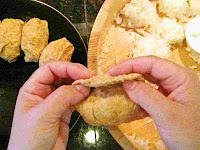<Ingredients>
Sumeshi sushi rice, prepared with 2 180 cc cups of rice (not in photo)
10 large or 20 small usuage thin deep-fried tofu packets
For broth
400 cc dashi
100 cc sake
1 tbsp mirin
4 tbsp soy sauce
3 tbsp brown sugar
<Directions>
1.
If using large usuage, cut in half. If using small usuage, cut one side.
Prep-boil until soft, at least 5 minutes.
Drain, and squeeze out extra water. Pat with paper towel to remove extra oil.
Open each piece to form a packet.
2.
In a medium pot, put all ingredients for broth, and bring to boil.
Put usuage, and cook on medium heat.
When liquid starts to boil, reduce heat to medium low, place otoshibuta drop-cover directly on usuage, and simmer until liquid is almost gone, approximately 25-30 minutes.
Turn off heat, and let cool.
3.
Prepare sushi rice.
When ready to assemble, make 20 loose balls of sushi rice. Do not squeeze rice too much. This is to make the assembly easy and is an optional process; rice should be fluffy when put in usuage packets.
Squeeze out extra broth of each usuage packet, put sushi rice in it, close the opening by placing one end over the other, and place upside down (opening side down) on a plate.
Ready to serve.
<Notes>
- Usuage is boiled longer in the prep stage to ensure it is soft and oil is eliminated (both for better flavor absorption) before it is cooked in broth.
- Usuage packets can be prepared in advance. I usually prepare them a day ahead.
- In some regions, additional ingredients (vegetables, dried young sardines) are mixed in sushi rice.
- “Inari” carries the nuance of a fox. The fox is a messenger and symbol for Inari, a Shinto sect. When you see a stone sculpture of a fox sitting in front of a shrine, it is an Inari shrine. The fox is said to like mice, which are difficult to catch for regular shrine offerings; thus deep-fried tofu that resembles cooked mice was used as a substitute. This in turn led to the folktale that foxes love usuage. Inarizushi is said to have been created in Toyokawa, an Inari shrine town, in today’s Aichi Prefecture during a major nationwide famine in the 1830s.
- Inarizushi is also called oinari or oinari-san, especially by women and kids as well as by adults talking to kids. You may have heard it called “inari sushi,” but this is incorrect to the eye and ear of native speakers. When two words (“inari” and “sushi”) are combined, the first “s” in “sushi” becomes a “z” (“inari” + “sushi” = “inarizushi”) – just a piece of linguistic trivia behind food names.













No comments:
Post a Comment